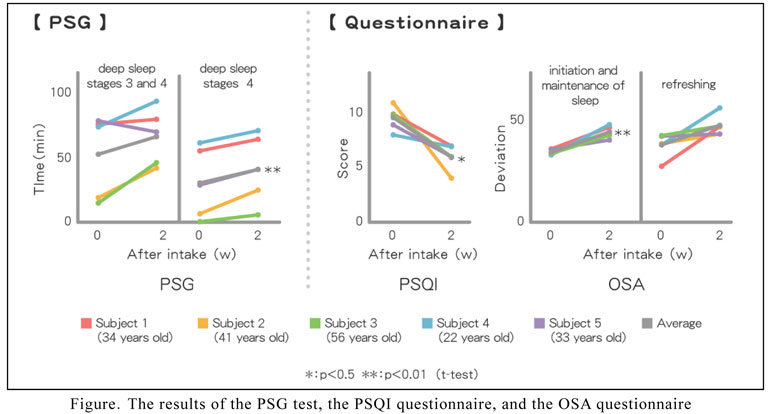- TOP
- List of reports
- The effect of Ezo-ukogi (Acanthopanax senticosus, Harms) in improving the sleep quality of healthy volunteers
The effect of Ezo-ukogi (Acanthopanax senticosus, Harms) in improving the sleep quality of healthy volunteers
【Scientific information】
Research and Development Department, Sun Chlorella Corporation
The effect of Ezo-ukogi (Acanthopanax senticosus, Harms) in improving the sleep quality of healthy volunteers
This study was presented at the Annual Meeting of the Japanese Society for Medical Use of Functional Foods, 2011
- Study Objectives
- Sleep is a physiological state that is essential for healthy living; nevertheless, the nocturnal
life style in which many people live in contemporary society can result in a shorter sleep
time or sleep-waking rhythm disorder. Nowadays, one in five Japanese adults has some
sleeping problem. Inhibited sleep may result in adverse effects on cerebral or immunity
functions, which may lead to the onset of depression or lifestyle diseases. It has also been
reported that reducing stress might result in improving the quality of sleep.
We therefore conducted a study of the effect of Ezo-ukogi (Acanthopanax senticosus, Harms) in improving sleep quality, because it was reported that this plant showed an anti-stress effect in some experiments.
- Method of experiments
- Five men who had complaints about sleeping took 40 tablets produced from Ezo-ukogi
roots made into powder with a dose of 20 tablets each after the morning meal and evening
meal, for 2 weeks.
The sleep states of each subject at the start of administration and 2 weeks later were assessed by an all-night polysomnography (PSG)*1 test, and questionnaires using the Pittsburgh Sleep Quality Index (PSQI)*2 and OSA Sleep Inventory MA version*3.
- Results
- The results of the PSG test show that there was some increase in deep sleep stages 3 and 4 and a significant increase in stage 4 in the subjects. Such increases were particularly significant in older subjects. In the PSQI questionnaire, every subject had a lower score, thus their sleeping complaints had improved. The results of the OSA questionnaire show that their deviations were significantly higher on the item of initiation and maintenance of sleep, and somewhat higher in on the item of refreshing (i.e., recovering from fatigue), so their sleep quality had improved. These results suggest that 2-week ingestion of Ezo-ukogi tablets may improve the sleep quality in human with sleeping complaints.

Terminology
- *1: Polysomnography (PSG)
- This is a test for assessing the sleep state on a comprehensive basis. The method quantifies the depth
of sleep, fragmentary sleep or arousal responses, and sleep efficiency by measuring brain waves and
eyeball movements.
Sleep is divided into four stages, 1 to 4. Sleep stages 3 and 4 are deep sleep.
- *2: Pittsburgh Sleep Quality Index (PSQI)
- This is a questionnaire system in which subjects are asked about the states of sleep that they had, and such states are assessed according to the total score on 18 items. The lower the score is, the better the sleep quality is.
- *3: OSA Sleep Inventory MA version
- This is a questionnaire system in which subjects are asked about their feeling of sleep just after they wake up on 20 items. The higher the deviation is, the better the sleep quality is.
Presentation at a scientific meeting
- Name of meeting:
- The Annual Meeting of the Japan Society for Medical Use of Functional Foods, 2011
- Title:
- The effect of Ezo-ukogi (Acanthopanax senticosus, Harms) in improving the sleep quality of healthy volunteers
- Presenters:
- Masako Hoshizaki1, Hideo Takekoshi1, Kou Takehara2, Yoshimichi Kouzai2
- Affiliation:
- 1)Sun Chlorella Corporation, 2)New Drug Development Research Center, Inc.





